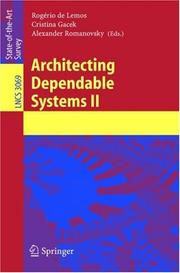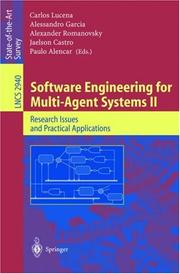| Listing 1 - 2 of 2 |
Sort by
|

ISBN: 3540231684 9783540259392 3540259392 Year: 2004 Publisher: Berlin, Heidelberg : Springer Berlin Heidelberg : Imprint: Springer,
Abstract | Keywords | Export | Availability | Bookmark
 Loading...
Loading...Choose an application
- Reference Manager
- EndNote
- RefWorks (Direct export to RefWorks)
As software systems become ubiquitous, the issues of dependability become more and more critical. Given that solutions to these issues must be taken into account from the very beginning of the design process, it is appropriate that dependability is addressed at the architectural level. This book results from an effort to bring together the research communities of software architectures and dependability. Inspired by the ICSE 2003 Workshop on Software Architectures for Dependable Systems, the book focuses on topics relevant to improving the state of the art in architecting dependable systems. The 15 thoroughly reviewed papers originate partly from the workshop; others were solicited in order to achieve complete coverage of all relevant aspects. The papers are organized into topical sections on architectures for dependability, fault-tolerance in software architectures, dependability analysis in software architectures, and industrial experience.
Computer architecture. --- Computer systems --- Fault-tolerant computing. --- Reliability. --- Computing, Fault-tolerant --- ADP systems (Computer systems) --- Computing systems --- Architecture, Computer --- Systems, Computer --- Computer science. --- Software engineering. --- Operating systems (Computers). --- Computer Science. --- Software Engineering. --- Operating Systems. --- Computer architecture --- Fault-tolerant computing --- Electronic data processing --- Electronic digital computers --- Fault tolerance (Engineering) --- Computer system failures --- Electronic systems --- Cyberinfrastructure --- Reliability --- Computer operating systems --- Computers --- Disk operating systems --- Systems software --- Computer software engineering --- Engineering --- Informatics --- Science --- Operating systems --- Operating systems (Computers)


ISBN: 1280307021 9786610307029 3540246258 3540211829 Year: 2004 Volume: 2940 Publisher: Berlin, Heidelberg : Springer Berlin Heidelberg : Imprint: Springer,
Abstract | Keywords | Export | Availability | Bookmark
 Loading...
Loading...Choose an application
- Reference Manager
- EndNote
- RefWorks (Direct export to RefWorks)
Advances in networking technology have revitalized the investigation of agent technologyasapromisingparadigmforengineeringcomplexdistributedsoftware systems. Agent technology has been applied to a wide range of application - mains, including e-commerce, human-computer interfaces, telecommunications, and software assistants. Multi-agent systems (MASs) and their underlying t- ories provide a more natural support for ensuring important properties such as autonomy, mobility, environment heterogeneity, organization, openness, and intelligence. As a consequence, agent-based systems are likely to provide new - proaches to dealing with the complexity of developing and maintaining modern software. However, developing robust large-scale agent-based systems will - quire new software engineering approaches. There are currently many methods and techniques for working with individual agents or with systems built using only a few agents. Unfortunately, agent-based software engineering is still in its infancy and existing software engineering approaches are unable to cope with large MASs. The complexity associated with a large MAS is considerable. When a huge number of agents interact over heterogeneous environments, various phenomena occur which are not as easy to capture as when only a few agents are working together. As the multiple software agents are highly collaborative and operate in networked environments, they have to be context-aware and deal with - vironment uncertainty. This makes their coordination and management more di?cult and increases the likelihood of exceptional situations, such as security holes, privacy violations, and unexpected global e?ects. Moreover, as users and softwareengineersdelegatemoreautonomytotheirMASs,andputmoretrustin their results, new concerns arise in real-life applications.
Software engineering --- Intelligent agents (Computer software) --- Computer science. --- Computer Communication Networks. --- Software engineering. --- Artificial intelligence. --- Computer Science --- Engineering & Applied Sciences --- Computer communication systems. --- Computer programming. --- User interfaces (Computer systems). --- Computer Science. --- Software Engineering/Programming and Operating Systems. --- Software Engineering. --- Programming Techniques. --- User Interfaces and Human Computer Interaction. --- Artificial Intelligence (incl. Robotics). --- AI (Artificial intelligence) --- Artificial thinking --- Electronic brains --- Intellectronics --- Intelligence, Artificial --- Intelligent machines --- Machine intelligence --- Thinking, Artificial --- Bionics --- Cognitive science --- Digital computer simulation --- Electronic data processing --- Logic machines --- Machine theory --- Self-organizing systems --- Simulation methods --- Fifth generation computers --- Neural computers --- Interfaces, User (Computer systems) --- Human-machine systems --- Human-computer interaction --- Computers --- Electronic computer programming --- Electronic digital computers --- Programming (Electronic computers) --- Coding theory --- Computer software engineering --- Engineering --- Communication systems, Computer --- Computer communication systems --- Data networks, Computer --- ECNs (Electronic communication networks) --- Electronic communication networks --- Networks, Computer --- Teleprocessing networks --- Data transmission systems --- Digital communications --- Electronic systems --- Information networks --- Telecommunication --- Cyberinfrastructure --- Network computers --- Informatics --- Science --- Programming --- Distributed processing --- Artificial Intelligence. --- Computer networks. --- User interfaces (Computer systems)
| Listing 1 - 2 of 2 |
Sort by
|

 Search
Search Feedback
Feedback About UniCat
About UniCat  Help
Help News
News